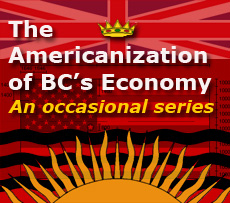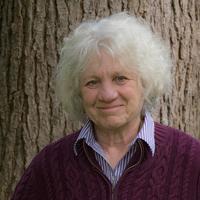
When Canadian Pacific made a bid in 1979 to purchase British Columbia's largest lumber company, MacMillan Bloedel, Premier Bill Bennett vetoed the idea. He said famously, "B.C. is not for sale."
That was then. Today B.C.'s forest industry and some other big chunks of the provincial economy are shifting into foreign hands, often American hands.
In June 1999, giant forestry company Weyerhaeuser of Federal Way, Washington, picked up the Canadian firm in a $2.45 billion deal. A month later, Louisiana Pacific, based in Portland, Oregon, bought Evans Forest Products in Golden, B.C., for $133 million. Today, of the three top forestry companies operating in B.C., Weyerhaeuser, Canfor, and Abitibi, only one, Canfor, is based in B.C. (And in global terms, it's a small player. After its merger with Slocan this year, it is still only the 38th largest forestry company in the world.)
Twenty-five years after B.C.'s then premier announced the province was not for sale, the current government not only enourages sales of Crown corporation assets, it seeks advice from foreign corporations and is willing to award major contracts to non-Canadian businesses.
Whose side are they on?
The sea change in official attitudes raises concerns among some business experts. John Helliwell, an economist at U.B.C., sees corporate conflicts of interest growing more common in B.C. He said, "When Weyerhaeuser took over MacBlo, the dynamic for the Canadian industry forming its position, making its case on softwood lumber became radically different. B.C.'s big gun was no longer reflecting B.C.'s interests."
There is a ripple effect going beyond our boardrooms. This August, the Canadian IWA voted to merge with the United Steelworkers of America. Gary Kobayashi of local 2171 on Vancouver Island was in favour. He said, "To me it made a lot of sense to be locked into an international union when we're dealing with an international company. Weyerhaeuser is a typically ugly American corporation. They want to weaken unions, contract out as much as possible, all the typical union-busting tactics. We've got an international campaign going against Weyerhaeuser. We wouldn't have been able to do something like that as a national union."
Four B.C. locals, however, didn't see it the same way. In the Prince George local, the opposition to the merger was particularly fierce: 90 percent of the 6,000 members voted no. Frank Everitt, president of that local said in a telephone interview with The Tyee, "We didn't buy into the story that big was always better. If you do your research, if you know the business that you're bargaining with, then you can do a good job for the membership. There's going to be competing interests in the United Steelworkers. The issue that comes to mind is the steel stud versus wood. We're okay as long as the price of steel is high. But if the two products come close in price, there's an issue."
Like Helliwell, Everitt also mourns the loss of political autonomy. "The Steelworkers supported Kerry versus Bush. We'd rather not support either one. I don't think either is worth a damn to us as far as the wood industry goes. Being independent, we'd have more freedom to criticize."
Terasen drops the 'B.C.'
As more public and private B.C. corporations transfer into American hands, the conflicts of interest Helliwell notes are likely to increase. One case in point may be Terasen.
In 1988, the B.C. government appeared to share Helliwell's concerns about foreign control of our businesses. That year, the Crown corporation, BC Hydro, sold its gas division. But the government imposed restrictions on the new company which came to be known as BC Gas. It limited the number of directors who could live outside the province, the percentage of shares that could be owned by one entity (10 percent), the percentage of shares that could be owned by foreigners (20 percent) and the location of the company headquarters. (It had to be in B.C.)
But BC Gas recently took the 'BC' out of its name, becoming 'Terasen' instead. This year, the B.C. government lifted all the restrictions dating from the late 1980s, creating the possibility that the company would further loosen its ties to B.C. Now, a non-Canadian can acquire a controlling interest in Terasen—B.C.'s 7th largest corporation in 2004, with assets of nearly $5 billion and about 2,000 employees.
'Americanization can be felt'
When corporations straddle borders, the culture inevitably changes. In July, CN got through the regulatory hurdles and closed the deal to buy BC Rail. CN is a Canadian company with headquarters in Montreal. However, its CEO, E. Hunter Harrison, is an American who was formerly the CEO of Illinois Central which CN purchased in 1998.
Dennis Byron, of the United Transportation Union represents train crews who were with BC Rail and are now with CN. In a phone interview from Prince George, he said he already sees Harrison's influence. Byron did not want to talk in great detail as negotations are underway to sign a new contract; the current one expires at the end of 2005. However, he gave one example of a change that Harrison is proposing.
Yard workers now have three breaks totalling one hour in an eight-hour day. Instead, Harrison wants them to get one twenty-minute break in a ten or twelve-hour day.
Workers in the Illinois division have already agreed to this. But Byron said, "My question was, 'What particular century are we negotiating in?' Effects of Americanization can be felt all over this country. It's just a whole mess. In my opinion, there is a complete and total deterioration of 150 years of what we've been fighting for and dying for in this country."
Ear for foreign advice
Not only foreign business owners, but foreign advisors, command increasing influence with B.C.'s government. A document published on the Ministry of Transportation website called "The Coquihalla Project Consultant Cost Summary" is revealing. There we see that the doomed project cost the B.C. taxpayers $4,222,688 in consultants' fees. $1,157, 016 went to a Swiss company called KPMG International, $845,023 went to the British AMEC, $266,794 was paid to another UK-based corporation, Halcrow, and $206,593 went to the American OPUS, who are design-build specialists.
Major construction contracts are being tendered to non-Canadian corporations. While public protest halted the Coquihalla, six other projects are either underway or planned. Like the Coquihalla, they are all private public partnerships or P3's: The Kicking Horse Canyon upgrade, the Golden Ears Bridge, the Okanagan Lake Crossing, the RAV line, the Sea to Sky Highway upgrade and the Sierra Yoyo Desan Road in northern B.C. On Oct. 21, the Ministry of Transport and Partnerships BC announced that three consortia had been selected to bid on the Kicking Horse Canyon project. Each consortia is composed of several other companies. It is entirely typical of the P3 way of doing business that out of the 17 firms involved in this bid, only four are B.C.-based.
So far the biggest government contract captured by a foreign corporation is the $1.45 billion dollar (Can) deal between BC Hydro and the American Accenture signed in April 2003. To fulfill the 10-year contract, Accenture formed Accenture Business Services for Utilities. This local subsidiary which does everything from billing to building management for BC Hydro has also grabbed Terasen as a customer.
Changing culture
Jerri New, president of COPE, the union representing the workers at Accenture, says she can already feel the cold wind from the south. "Although they claim to be here, we don't see a commitment from them to keeping jobs in B.C. A lot of our work has been shipped out to New Brunswick. If you call Terasen about a problem with your gas bill, you may be talking to someone in New Brunswick." New is worried that even more jobs may be lost now that Terasen is legally able to locate its headquarters outside B.C.
Dean Pelkey, media relations manager for Terasen, assured The Tyee, "We have no plans to move anywhere."
New says further, "It's a different culture. There's more of an emphasis on the bottom line than on serving the customers well." In 2004, the BC Utilities Commission received 407 complaints from customers of Terasen, double what it received in 2003. Irate customers, 158 of them, also complained to the Commission about BC Hydro, again over double the number who complained in 2003. The majority of the problems were about security deposits and having services disconnected.
Since contracting their customer relations out to Accenture, both BC Hydro and Terasen have 'tightened' up their collection processes. Terasen now requires that people with a bad credit rating or no record pay a security deposit equal to two months of bills. Dean Pelkey says, "If we are carrying a lot of customers who haven't paid their bills, there are costs associated with that, that are shared equally by good customers who pay their bills on time. Everyone should pay for the full cost of the service they use. If you pay your bill on time, why should you subsidize your neighbour, if they're not going to pay?"
Right strategy for future?
Dick Gathercole is the executive director of the BC Public Interest Advocacy Centre. He has different ideas about fairness. "The one size fits all model is not appropriate. There should be flexibility. On welfare, a $50 security deposit is huge. I could afford a $500 or $600 security deposit, easier than someone on welfare could afford a $50. If the whole purpose is to get them to pay their bills, then that's what they should be doing."
"The government has placed a lot of emphasis on luring foreign investment in place of a creative industrial strategy," says Marc Lee, an economist with the Canadian Centre for Policy Alternatives in Vancouver. "We would be better off with a made-in-B.C. approach to economic development rather than slashing our regulations, lowering our tax rates, and hoping foreign investors will come and create our jobs for us. If you can align investment decisions with public policy, then you're better off. Local firms aren't always going to behave that way but they are more likely to."
According to a Statistics Canada report, in 2002, 14.5 per cent of B.C.'s corporations were controlled by foreign owners. The U.S. had the biggest share of the pie—5.6 per cent.
Claudia Cornwall is a regular contributor to The Tyee.
![]()















Tyee Commenting Guidelines
Comments that violate guidelines risk being deleted, and violations may result in a temporary or permanent user ban. Maintain the spirit of good conversation to stay in the discussion.
*Please note The Tyee is not a forum for spreading misinformation about COVID-19, denying its existence or minimizing its risk to public health.
Do:
Do not: